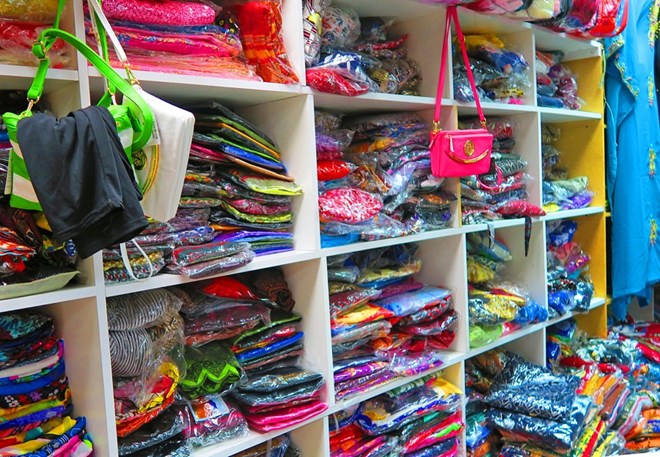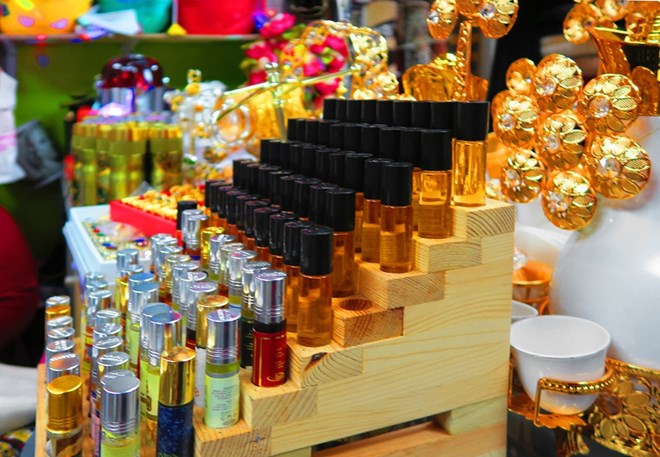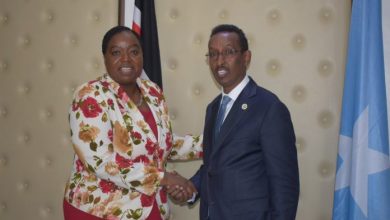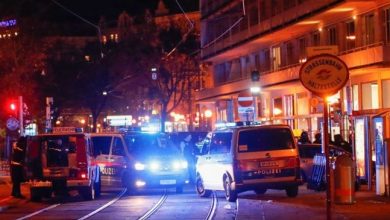International mall offers a cultural experience & unique shopping
Few Americans travel to Africa and even fewer have been to Somalia. But you can get a taste of African and international culture and goods right here in Louisville at the International Mall at Eighth and York streets.
Few Americans travel to Africa and even fewer have been to Somalia. But you can get a taste of African and international culture and goods right here in Louisville at the International Mall at Eighth and York streets.
A large warehouse-type building is separated into small rooms housing several businesses, including shops, tailors, groceries and even a barber, all owned by independent business owners who come together to support each other. If you’ve ever traveled to a country with a market area or medina, you’ll recognize the small stalls that use every inch of space to store and display wares. Brightly colored rugs, dresses and curtains line the walls and hang from the ceilings. There are beautiful golden tea sets, plates and stackable cookware, alongside faux flower arrangements and beautiful headscarves.
Most of the shop owners in the building are Somali, as the mall was started by some Somali friends who saw a need for people to be able to support themselves. “But there are American, Bangladeshi, Ugandan, Congolese and many other cultures in the building,” says Ismail Ali, whose wife, Farhiyo Mohamud, owns Farhiyo’s Fashions in the building. Ismail and Farhiyo are from Kismayo, a port town in Southern Somalia.
Ismail and Farhiyo fled Somalia and lived in South Africa for many years where they owned businesses. But the crime and chaos in the country made things difficult for business. “The business was good in South Africa, but there was looting, vandalizing, killing … every single minute you would have arrests,” says Ismail. “You see a person put an item in his pocket now, is he going to pull out his gun or his money? You will be in battle all day. In the nighttime, they come over the roof. While you are sleeping, you have done everything for safety in your house, but they cut a hole in the roof and they come in and demand all your money. Sometimes they take the money and kill you and set fire to the house.”

The shelves of Hamdi are stocked with clothing, scarves and purses. The store is owned by Abiba Manoor.
Farhiyo, who was also a business owner back in Somalia, got to Louisville with their daughter first, but it took longer for Ismail to join her because of extensive immigration paperwork. After four years apart, he finally reunited with them in Louisville. They both initially worked in warehouse jobs, but Farhiyo, who is still suffering the effects of beatings she endured in South Africa, struggled with her health, and standing at the warehouse all day was too difficult for her. So Ismail, who is also part-owner of Safari International Grocery Store, used his entrepreneurial know-how to help her set up Fahriyo’s Fashions in the International Mall, where she sells clothing, scarves, perfumes and more.
Ismail and Farhiyo left nine of their children behind in Somalia and regularly send them money from their earnings in the United States. But as you talk to this couple, you would have no inkling of the pain they’ve endured — they are kind and effusive, eager to welcome you into their extended family and help you find what you need.
When you walk into the International Mall, you are likely to be greeted with a, “Hello, sister. What are you looking for?” by one of the many women who own businesses in the mall.
One such owner, Abiba Manoor, is a native of Mogadishu, Somalia. She came to the United States 17 years ago, and her store, Hamdi, has been in the mall since it opened in 2008. Abiba says that the mall offers items that you can’t find anywhere else in Louisville. “We are international businesses,” she says. “We are different from American businesses. In our shops, you can find different things.”
 Many perfume options are available at Farhiyo’s Fashions.
Many perfume options are available at Farhiyo’s Fashions.
Ismail said the camaraderie of the mall forms a support system, too. “They are our brothers and sisters; we stay together all through the day,” he says. “If you need change, you go to your friend and get change from him. It’s a part of integration.”
Ismail was a farmer back home and owned about 50 acres of land. He grew mangoes, coconuts, corn, beans and other fruits and vegetables, and he wishes he could go back home someday.
“I would be very much happy to go back to see my land,” he says. “Now, I’ve got a lot of knowledge. There are so many things I could plant now and make a lot of money.” As a farmer in Somalia, he was able to make good money. “To get $10 is very hard here,” he says.
Ismail and Farhiyo continue to work to grow their businesses and reach for their part of the American Dream. They want people to know about their businesses and to come explore and shop the International Mall.
“I would like to let people know there is a business here — a small business,” says Ismail. “And we would like people to buy from us. We opened for them; we didn’t open just for other Somalis. We opened for the community. We are here in America. We need people to come here and buy things from us. So instead of going to a big shopping mall, come here to see people who will appreciate your support and be happy to have you.”





